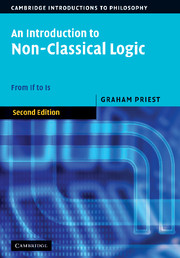Book contents
- Frontmatter
- Contents
- Preface to the First Edition
- Preface to the Second Edition
- Mathematical Prolegomenon
- Part I Propositional Logic
- Part II Quantification and Identity
- 12 Classical First-order Logic
- 13 Free Logics
- 14 Constant Domain Modal Logics
- 15 Variable Domain Modal Logics
- 16 Necessary Identity in Modal Logic
- 17 Contingent Identity in Modal Logic
- 18 Non-normal Modal Logics
- 19 Conditional Logics
- 20 Intuitionist Logic
- 21 Many-valued Logics
- 22 First Degree Entailment
- 23 Logics with Gaps, Gluts and Worlds
- 24 Relevant Logics
- 25 Fuzzy Logics
- Postscript: A Methodological Coda
- References
- Index of Names
- Index of Subjects
20 - Intuitionist Logic
Published online by Cambridge University Press: 05 June 2012
- Frontmatter
- Contents
- Preface to the First Edition
- Preface to the Second Edition
- Mathematical Prolegomenon
- Part I Propositional Logic
- Part II Quantification and Identity
- 12 Classical First-order Logic
- 13 Free Logics
- 14 Constant Domain Modal Logics
- 15 Variable Domain Modal Logics
- 16 Necessary Identity in Modal Logic
- 17 Contingent Identity in Modal Logic
- 18 Non-normal Modal Logics
- 19 Conditional Logics
- 20 Intuitionist Logic
- 21 Many-valued Logics
- 22 First Degree Entailment
- 23 Logics with Gaps, Gluts and Worlds
- 24 Relevant Logics
- 25 Fuzzy Logics
- Postscript: A Methodological Coda
- References
- Index of Names
- Index of Subjects
Summary
Introduction
20.1.1 In this chapter we will look at one more logic with possible-world semantics: intuitionist logic.
20.1.2 After a brief prolegomenon, we will look at the semantics for this. We will then look at two tableau systems. The first is close to the tableau system for variable domain modal logic of chapter 15. The second is slightly more complicated to formulate, but produces simpler tableaux.
20.1.3 All this without identity, which is thrown into play in the second half of the chapter.
20.1.4 En route, we will also look at some philosophical issues concerning existence, construction and identity.
Existence and Construction
20.2.1 Mathematical Platonists think of mathematical objects as existing in some objective realm, just like (we normally think that) stones and stars do; it is just a realm that is out of causal contact with us – or anything else. As we observed (6.2.5) mathematical intuitionists reject this view.
20.2.2 So what, according to them, does it mean to say that a mathematical object exists? It means that we are able to construct it; that is, that there is some recipe we can follow to produce it. Obviously, the entity constructed is not a physical entity; we may call it a mental (or maybe social) entity. Thus, mathematical objects have no cognition-independent existence.
20.2.3 As we also observed (6.2.6), an intuitionist needs to give the proof conditions for sentences (where a proof is something that can be recognised as such).
- Type
- Chapter
- Information
- An Introduction to Non-Classical LogicFrom If to Is, pp. 421 - 455Publisher: Cambridge University PressPrint publication year: 2008



